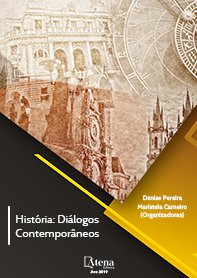
Ilê Oju Odé: políticas de resistência e territorialidades no candomblé de Goiás
Este trabalho se desenvolve junto ao
terreiro de candomblé Ilê Oju Odé situado em
Aparecida de Goiânia-Goiás e nos espaços de
atuação deste terreiro, através do Afoxé Omo
Odé e da organização do Fórum Goiano de
Religiões de Matriz Africana. O Fórum e o Afoxé
vêm se constituindo como organização política
e se destacando no sentido de apresentar
o candomblé para a sociedade goiana e
reivindicar seu espaço nela. Concluímos, a
partir da experiência no terreiro pesquisado, que
o candomblé se constitui como conhecimento
alternativo à matriz do pensamento colonial,
ou utilizando o conceito de Walsh (2013)
como exemplo de uma “pedagogia decolonial”.
Talvez possamos dizer que o Fórum e o Afoxé
possibilitam aos membros dos terreiros lerem
o mundo a partir de si, dos seus valores e
proporem algo.
Ilê Oju Odé: políticas de resistência e territorialidades no candomblé de Goiás
-
DOI: 10.22533/at.ed.59419230814
-
Palavras-chave: Candomblé. Crítica decolonial. Prática de descolonização.
-
Keywords: Candomblé. Decolonial criticism. Decolonization practice.
-
Abstract:
This work is carried out by the
candomblé Ilê Oju Odé terreiro (cult-house),
located at Machado de Assis Street, 37th,
neighborhood Cidade Satélite São Luís,
Aparecida de Goiânia-Goiás, and in the spaces
where this terreiro (cult-house) operates
through Afoxé Omo Odé and the organization of
the Goian Forum of Religions of African Matrix.
The Forum and Afoxé have been establishing
themselves as a political organization and
have stood out in order to present candomblé
for the society of Goiás and to claim its space
in it. We can affirm, from the experience in the
terreiro (cult-house) surveyed, that candomblé
constitutes as alternative knowledge to the
matrix of colonial thought, or using the concept
of Walsh (2013) as an example of a "decolonial
pedagogy". Perhaps we can say that the Forum
and the Afoxé allow the members of the terreiros
(cult-houses) to read the world from themselves,
their values and propose something.
-
Número de páginas: 15
- Victor Hugo Basilio Nunes


